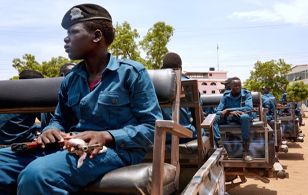COVID-19 worsens press freedom violation in South Sudan
Submitted by fkakooza on

A report by a regional media development organisation has raised a red flag over the increased attacks on freedom of the media during the COVID-19 period. The report, produced by the Uganda-based African Centre for Media Excellence (ACME), notes that the COVID-19 pandemic worsened the already fragile press freedom situation in South Sudan, with journalists being continuously subjected to violence and acts of intimidation across the country.
According to the report which was launched in March 2022, the major type of threat was denial of access to information, with 55% of the journalists surveyed saying they were denied access to information.“COVID-19 has slowed access to information in South Sudan. During the COVID-19 era the number of journalists covering events reduced due to the need to avoid overcrowding and infections” said Gabriel Kiir Amoi, a reporter with South Sudan Broadcasting Corporation (SSBC).
Other threats suffered during the pandemic were arrests and detention and malicious damage of journalistic working equipment. In 2020, the Union of Journalists of South Sudan (UJOSS) observed unacceptable levels of attacks against independent media and journalists in Juba, where press freedom has already been restricted in recent years. In fact, the state of press freedom in South Sudan has been on the decline since the 2013 civil war. “Recently, the Juba Monitor newspaper was banned from publication for publishing Members of Parliament’s monthly salaries,” Amoi added.
This is in spite of the fact that throughout the pandemic, independent journalism has been a vital resource to people. “Therefore, government’s efforts to control the media message and pre-empt public scrutiny ran counter to the public interest and represented a serious breach of people’s rights” said James Oyet, a member of UJOSS.According to media reports, government officials targeted journalists for reporting about the failure of the administration to manage the pandemic. Cases were filed against six journalists in Juba for their reports about hunger amongst migrant workers stranded due to the sudden lockdown imposed by the government.Some media workers were arrested on 27 August 2020 and some radio stations were shut down for operating during the COVID-19 Pandemic in violation of the Standard Operating Procedures (SOPs).
Meanwhile, one journalist who preferred anonymity is hopeful that the situation is changing or the better. “While many challenges remain, such as threats and intimidation, government censorship and fears of arrest, a shift appears to be happening,” they said. Press members have pushed to incorporate media rights into the constitution, and getting access to more funding and training, something the Canadian non-profit, Journalists for Human Rights, is helping with.
- 302 reads
